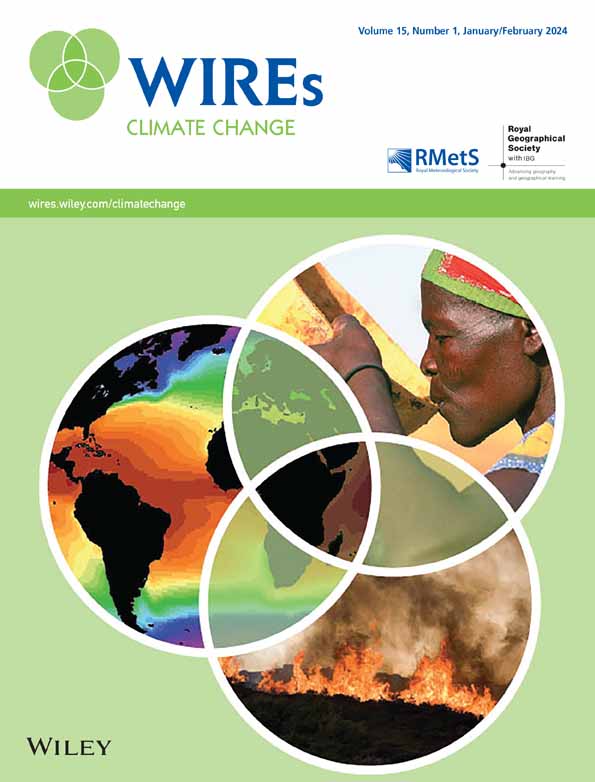韧性中的力量和气候变化学术中的韧性力量
IF 10.3
1区 环境科学与生态学
Q1 ENVIRONMENTAL STUDIES
引用次数: 5
摘要
近几十年来,弹性思维经历了深刻的理论发展,将弹性描述为一个社会-自然过程,需要一系列行为者和机构之间不断协商。这种理解的基础是越来越多的人认识到权力在塑造跨文化和地理背景的弹性能力和政治方面的作用。这篇综述文章借鉴了一项批判性的内容分析,应用于对最近弹性文献的系统回顾,以研究学术界如何接受权力在弹性工作中如何运作的细微概念,以摆脱有可能加强边缘化模式的框架。在女权主义理论和女权主义政治生态学的启发下,我们推进了一个框架,分析了最近的工作是如何呈现、记录和概念化弹性如何与不平等模式相交的。在这样做的过程中,我们阐明了知识、规模和主体制造在理解权力和弹性相互联系的复杂方式中的重要性。我们将说明,忽视这种复杂性可能会对社会-自然挑战和解决方案如何在弹性学术中形成,以及如何在实践中规划和实施弹性产生严重后果。最后,我们强调了最近的学术是如何推动理解必要的,以理解弹性的变化,争议和权力负载的本质。关注这种复杂性并以此为基础,将使学术工作能够阐明在不公平的过程中谈判恢复力的方式,并解决那些继续承受气候危机冲击的人的边缘化问题。本文章由计算机程序翻译,如有差异,请以英文原文为准。
Power in resilience and resilience's power in climate change scholarship
Resilience thinking has undergone profound theoretical developments in recent decades, moving to characterize resilience as a socio‐natural process that requires constant negotiation between a range of actors and institutions. Fundamental to this understanding has been a growing acknowledgment of the role of power in shaping resilience capacities and politics across cultural and geographic contexts. This review article draws on a critical content analysis, applied to a systematic review of recent resilience literature to examine how scholarship has embraced nuanced conceptualizations of how power operates in resilience efforts, to move away from framings that risk reinforcing patterns of marginalization. Advancing a framework inspired by feminist theory and feminist political ecology, we analyze how recent work has presented, documented, and conceptualized how resilience intersects with patterns of inequity. In doing so, we illuminate the importance of knowledge, scale, and subject making in understanding the complex ways in which power and resilience become interlinked. We illustrate how overlooking such complexity may have serious consequences for how socio‐natural challenges and solutions are framed in resilience scholarship and, in turn, how resilience is planned and enacted in practice. Finally, we highlight how recent scholarship is advancing the understandings necessary to make sense of the shifting, contested, and power‐laden nature of resilience. Paying attention to, and building on, such complexity will allow scholarly work to illuminate the ways in which resilience is negotiated within inequitable processes and to address the marginalization of those continuing to bear the brunt of the climate crisis.
求助全文
通过发布文献求助,成功后即可免费获取论文全文。
去求助
来源期刊

Wiley Interdisciplinary Reviews: Climate Change
METEOROLOGY & ATMOSPHERIC SCIENCES-
CiteScore
20.00
自引率
2.20%
发文量
58
审稿时长
>12 weeks
期刊介绍:
WIREs Climate Change serves as a distinctive platform for delving into current and emerging knowledge across various disciplines contributing to the understanding of climate change. This includes environmental history, humanities, physical and life sciences, social sciences, engineering, and economics. Developed in association with the Royal Meteorological Society and the Royal Geographical Society (with IBG) in the UK, this publication acts as an encyclopedic reference for climate change scholarship and research, offering a forum to explore diverse perspectives on how climate change is comprehended, analyzed, and contested globally.
 求助内容:
求助内容: 应助结果提醒方式:
应助结果提醒方式:


